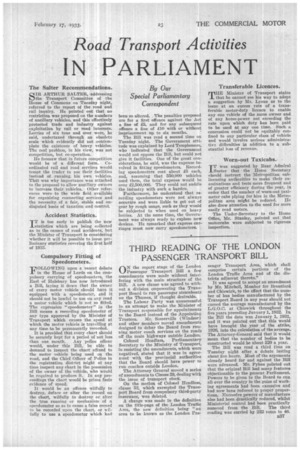Road Transport Activities
Page 51

If you've noticed an error in this article please click here to report it so we can fix it.
IN PARLIAMENT
By Our Special Parliamentary Correspondent
The Salter Recommendations.
SIR ARTHUR SALTER, addressing the Transport Committee of the House of Commons on Tuesday night, referred to the report of the road and rail inquiry. He pointed out that no restriction was proposed on the numbers of ancillary vehicles, and this effectively protected trade and industry against exploitation by rail or road interests. Lorries of six tons and over were, he said, undertaxed through an obsolete scale which evidently did not contemplate the existence of heavy vehicles. The real problem, in his view, was not competition, but co-operation.
He foresaw that in future competition would be of a different form. Co. ordinates] rail and road services would tempt the trader to use their facilities instead of running his own vehicles. That was why importance was attached to the proposal to allow ancillary owners to increase their vehicles. Other references were to the wide field available for organizing connecting services and the necessity, of a fair, stable and undisputed basis of taxation and control.
Accident Statistics.
IT is too early to publish the new statistics which are being collected as to the causes of road accidents, but the Minister of Transport is considering whether it will be possible to issue preliminary statistics covering the first half of 1933.
Compulsory Fitting of Speedometers.
FOLLOWING upon a recent debate in the House of Lords on the compulsory carrying of speedometers, the Earl of Halsbury has now introduced a Bill, laying it down that the owner of every motor vehicle should have it equipped with a speedometer, and it should not be lawful to use on any road a motor vehicle which is net so fitted. The expression " speedometer " in the Bill means a recording speedometer of any type approved by the Minister of Transport which causes the speed at which the motor vehicle is travelling at any time to be permanently recorded.
It is provided that every chart should be securely kept for a period of not less than one month. Any police officer would, under this Bill, be able to demand to inspect the chart affixed to the motor vehicle being used on the road, and the Chief Officer of Police in the registration district might at any time inspect any chart in the possession of the owner of the vehicle, who would be required to produce it. In any proceedings the chart would be prima facie evidence of speed.
It would be an offence wilfully to destroy, deface or alter the record on the chart, wilfully to destroy or alter the true running or mechanism of a Npoedometer so as to cause a false record to be recorded upon the chart, or wilfully to use a speedometer which had been so altered. The penalties proposed are for a first offence against the Act a fine of £5, and for any subsequent offence a fine of £10 with or without imprisonment up to six months.
The Bill was read a second time on Tuesday night. The Government attitude was explained by Lord Templemore, who indicated that the Government would not oppose the Bill, but could not give it facilities. One of the great considerations, he said, was the expense involved in fitting speedometers. Recording speedometers cost about £5 each, and, assuming that 550,000 vehicles used them, the total expense would be over £2,500,000. They could not saddle the industry with such a burden.
Furthermore, be understood that recording speedometers were not always accurate and were liable to get out of gear by rough usage, such as they would be subjected to when used on heavy loriies. At the same time, the Government was always ready to explore new devices. He remarked that express carriages must now carry speedometers.
Transferable Licences.
THE Minister of Transport states that he cannot see his way to adopt a suggestion by Mr. Lyons as to the issue at an. excess rate of a transferable motor-duty licence to enable any one vehicle of the same owner and of any horse-power not exceeding the rate upon which duty has been paid to be used at any one time. Such a concession could not he equitably confined to any particular class of vehicle and would involve serious administrative difficulties in addition to a substantial loss of revenue.
Worn-out Taxicabs..
IT was suggested by Rear Admiral Sueter that the Home Secretary should instruct the Metropolitan cablicensing authorities to make their examinations and tests more frequent and of greater efficiency during the year, in order that the number of worn-out taximeter cabs plying for hire in the Metro
politan area might be reduced. He also drew attention to the need for more easily read meters.
The Under-Secretary to the Rome Office, Mr. Stanley, pointed out that motorcabs were subjected to rigorous inspection.




























































































